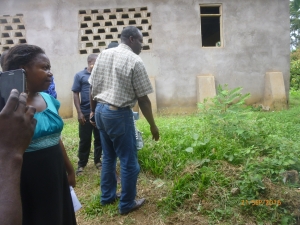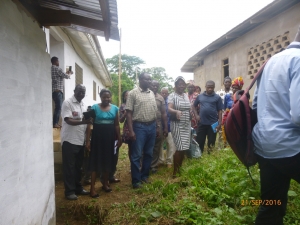Cassava project in Cameroon
The project started late due to serious rainfall with the construction of a building that will host the Unit for the transformation of Cassava into garri, water-fufu, myondo etc. However, the women planted cassava in the acquired land. In February, 2015 cassava planted on the 15 hectares of land was harvested.
WHAT HAS BEEN REALISED:
15 Hectares of land was acquired cleared and cultivated by the women. Also, 120.000 cuttings of cassava was bought and planted by the women. The first cassava that was harvested, part was transformed locally, part was transformed using a small machine provided by the Kumba Urban Council. The Machine that has a very low capacity was hired by the Council just to assist the women to grind their first harvest. It has a low capacity hence the women had to use more time and labour to grind the cassava. All this is because the machines had not been purchased because funds to purchase the machines came late.
Puchases for the project was done mostly twice for every item. 40 Cutlasses were bought, 40 Hoes, 45 Basins, 24 Drums, 20 Trunks, 2 Motorized Graters, 4 cassava Press, 5 Garri-Ovens, 20 wheel Barrows, 5 Sealing Machines, 1 Scale. We were very lucky to have bought most of the items before prices of goods in Cameroon rose. Prices have since almost doubled in every of these items and other goods in Cameroon.
As far the construction of the house is concerned, we were also lucky but not in all items. Sand, iron rods, ply wood, zinc blocks etc. were all bought at the estimated price but we were not lucky with the last 60 bags of cement because the price had risen. Prices of all these items have risen. Still during the construction, it was discovered that we did not include tiles in the project. This was a mistake. We got some assistance from the Kumba Urban Council while the women raised part of the money from the sale of the first cassava that was harvested in February, 2015. This helped us to buy the tiles. Without the tiles, it was discovered, the production unit will be very untidy.
Before the installation of the machines, two young men in the village went for a 4 days training workshop on how to operate the machines. A Management Committe was also put in place, which also includes the Chief of the village and the Divisional Delegate for Agriculture and Rural Development for Meme Division as members. In the next 3 months, three workshops will be organised by the Delegation of Agriculture to strenthen the capacity of women in the field of cassava and garri. They has already participated in many workshops in the past. A follow-up report will be sent to Bingo Lottostiftung as the project evolves at least annually.
Installation and HANDING of CASSAVA PROCESSING UNIT Kake Community Kumba MEME Division in the South West Region of the Republic of Cameroon on 21st of September 2016. The occasion was postponed several times because of reasons we sent to you last time.
The occasion started at 1:00pm
More than 250 persons were present for the Installation Ceremony. Amongst them were:
- The Divisional Delegate of Agriculture and Rural Development for Meme
- The Mayor of Kumba I Urban Council
- The Sub Divisional Delegate of Agriculture and Rural Development for Limbe 1
- The chief of Agricultural Post for Kake
- The traditional chief and notables of Kake I, Kake II, Ekombe Bonji and its environs
- Oher Civil Society Organisations involved in Development 03 in number
- The journalists
- Representatives of Farmers Groups
- A cross section of the population of Kake and neighbours
The following agenda was adopted:
- Singing of the National Anthem
- Prayer
- Welcome word traditional chief of Kake
- Presentation of NGO (AFRICA INITIATIVE e.V.) by association’s representative in Cameroon
- Speech by Divisional Delegate of Agriculture and rural development Meme
- Presentation of the Unit
- Intertainment
- Closing remarks by the Dvisional Delegate of Agriculture and Rural Development for Meme Division
After the singing of the National Anthem, a man of God who doubles as the quarter head for the Kake community called down the presence of God on the occasion.
The chief in his eloquent speech welcomed all the persons present and expressed his joy for the wonderful gestures AFRICA Initiative was making in Kake in areas of education, Income generating Material and School Support provision of Labour serving devices and poverty alleviation. He told the representative of Afrika Initiative in Cameroon to channel his sincere thanks to the Bingo Lotto Foundation for the wonderful Cassava Project which will help erradicate poverty not only in Kake II and Kake I but also to the surrounding areas.
Speaking later the Mayor of Kumba I Council thanked the women for their hardwork. He said it is the hard work of these Women Group that led to what to the sponsorship of this project. He told the women of other areas around the Kumba minicipality who have groups tostregthen their groups and learn from the the Kake Katholic Women’s Group. He equally asked the Coordinator of Afrika Initiative in Cameroon to thank Bingo Foundation for the wonderful gesture. He also told the Men’s Group to emulate from the women.
The Divisional Delegate for Agricllture and Rural Development for Meme took his turn and reiterated the efforts of Africa Initiative in poverty alleviation and the importance of the Unit in Kake and its neighbours. He further advised the women to acquire more land and increase their production to meet up with the capacity use of the processing unit put at their disposal. (speech attached)
He ended his speech by informing the population of the availability of 100.000 Cassava cuttings in his office which they should collect and plant to increase their productivity and of the unit thereby alleviating poverty and improving on their livelihood.
The representative of Africa Initiative led the invited guest and the population to the Cassava Processing Unit, presented and explained the set up and functions of the machines and equipment.
Refreshment followed and a closing remark from DDARD closed the occasion. The Sub DDARD took down the names and quantities of those who needed the cassava cuttings.
Ladies and Gentlemen,
I write to once more apologise for the late finish in this project and to thank you for your understanding. We promise that this will never happen. We shall do everything in the future to avoid opening ceremonies that will cost us time and money. It is regrettable that the opeing ceremony took place just this 21st of September, 2016.
We also thank you for your support and we look forward to working with you on more projects to come.



























